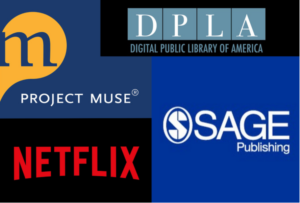In response to the pandemic, many vendors and publishers are making scholarly content temporarily available for free. IU Libraries have created a guide that aggregates academic resources that have been made freely available temporarily during the pandemic. This guide is intended to assist librarians, faculty, and researchers in finding resources to support teaching, learning, and discovery as classes have moved online for the foreseeable future.

The guide includes links to a number of community-built lists that are tracking free access to vendor resources. The International Coalition of Library Consortia, for instance, has created a list of information service providers who are offering expanded content access due to COVID-19. These lists cover a variety of free resources including textbook and monograph offerings, music, electronic resources, online learning services and platforms, as well as analytics platforms.
In addition, many publishers are providing temporary access to eBooks, scholarly journals, videos, and other media. Project Muse, for instance, is offering open access eBooks and journals from several distinguished university presses and scholarly societies. In an effort to support educators, the Association for Science Education has made its 2019 and 2020 journal content temporarily open access. Netflix has also made a selection of their documentary features available on the Netflix U.S. YouTube Channel. The IU resources guide provides links and descriptions for all of these resources.
Multiple publishers have made research specifically related to COVID-19 freely available. SAGE publishing, for instance, is providing researchers with access to all of their COVID-19 related content. For additional open access research specific to COVID-19, see the COVID-19 Research page in this guide. Please note that a few of the research resources listed there are pre-print servers. That content is not vetted research as it has not been peer-reviewed.
The guide also includes a list of resources that are always open access. The benefit of these resources is that they are not only free to use, they can be openly used, edited, stored, and distributed. Additionally, many of these resources can be downloaded then accessed offline by students, even long after the end of a course. Digital Public Library of America (DPLA), for instance, organizes a wide range of cultural heritage resources that are free and immediately available in digital format.
Finally, the Internet Archive is another extensive resource currently available. It holds millions of books, videos, audio files, and archived web pages on a wide range of topics.
Please note that access to many these resources is temporary, and a resource may be withdrawn without notice by the vendor. This guide will continue to be updated as we discover additional resources.
Leave a Reply